HSCO Featured Vendor | Meet "B & G Handmade".
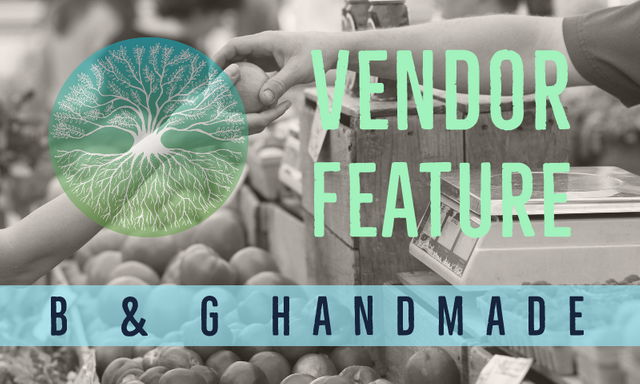
Hello again from @SenorCoconut,
Here it is at last... THE VENDOR FEATURE OF THE WEEK!!!!
Today, we're going to ask a few questions to reflect the ethics and ideologies of one vendor at HSCO, B & G Handmade. You can also find them on steemit @bghandmade!
Building a community is about clear communication and the willingness to support one another. As Homesteaders Co-op grows, we must keep in mind that the complexity and diversity of its moving parts may also expand, so here we are helping this free market stay running smooth together.
We found it essential for the good of everyone to highlight the vendors of the HSCO market place. Wouldn't be nice to know the individuals and families offering their goods and services a little more?
Every week vendors are featured on the web site. As a community, we thought that every week, we should feature these vendors here on the Steem blockchain (@HomesteadersCoop) to give everyone that much more exposure.
It takes a village to raise a child, because when people help eachother life is easier for everyone involved.
Without further ado, here are a few question I've conjured up... let's meet b & g handmade:
SC: Looking at your website and the photos of your paper products, it looks like you really enjoy creating it all. Can you tell us about your thinking process and what kind of intentions do you put into it while you create? Feel free to talk about your seed product or any other things you are selling alongside those awesome paper goods, by the way.
B&G: That’s a very broad question :) Probably the answer is going to cover the second question as well! For our handmade paper, our initial intention was to find a creative outlet for all the paper scrap we produce in the daily job (a small self-owned ad agency, specializing in printed media). Yearly we deliver to factory recycling over a metric ton of paper scraps, but some are just too good to dump down the processing line.
So we thought, what could be made to not just recycle this junk paper, but add value as well, upcycle as the term goes. And stuff like papier mache and collages really are not our type of work, what we like is getting down to the basics and creating a simple product from scratch.
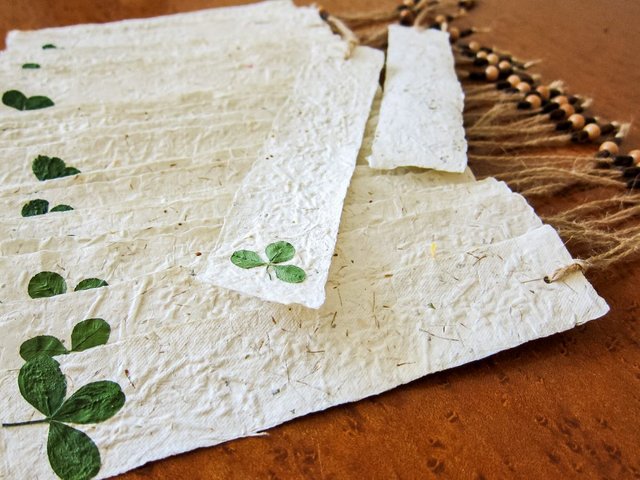
We really wanted to underline the message of turning scrap into something useful and beautiful at the same time. We make great effort to educate our prospective clients, as well as try to set an example with our daily life and work. Yes, our product costs more than conventional printed materials, but it’s also “open source” and everyone can try and do it himself if so inclined. There’s no secret process, no secret ingredient, all the steps are described on our website and we also do regular workshops and demos - the kids love those, by the way! So if there are any homeschoolers out there or just partens on the lookout for a creative project for the kids, try handmade paper!
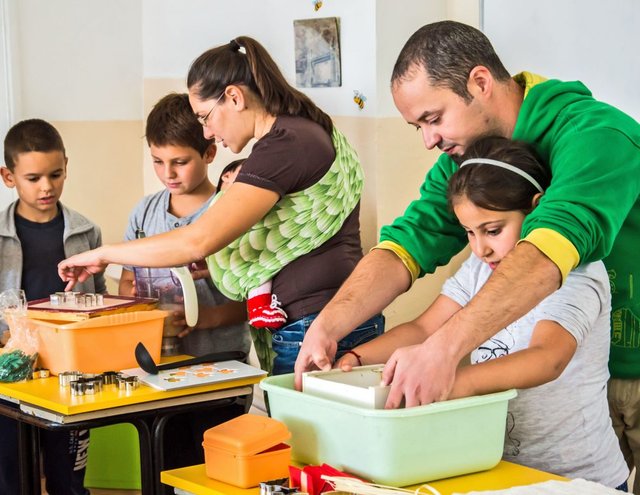
That was 10+ years ago and in this period there have been changes to our process and thinking, as well as general perception of the handmade paper craft. What started as a free time experiment turned into a medium volume paying hobby that allows Geri to continue to be a “stay at home working mom” and take care of the kids as well as doing most of the actual work on the handmade paper project. Bobby is managing the orders, customers, design, shipping and provides the business point of view. Most of our orders are local, from Bulgaria. We don’t have an exact number, but we usually do about 5-10 international orders per year, while we have several dozens of local ones.
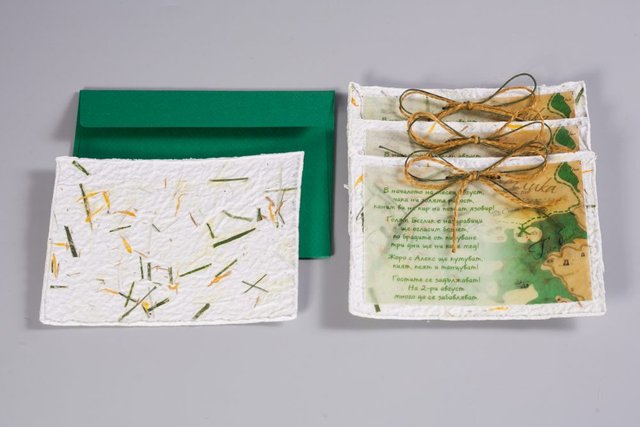
Working mostly locally has the great benefit of being able to see and talk to your customers before the actual order is made. This allows a better expression of our passion for handmade and natural things and often a live meeting is the decisive factor in placing the order. Another nice side-effect of working a niche market is that most of our potential customers are already at least partially “tuned” to that natural vibe and it’s easier to find a common ground and language.
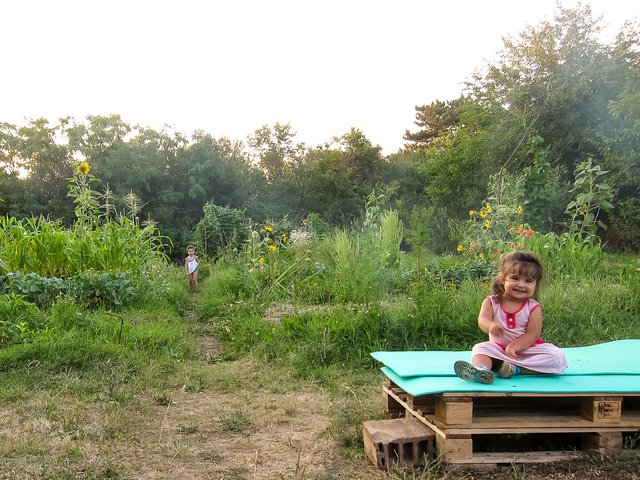
Oh and a few words about the seeds we’re selling on the HSCO. We’ve never sold seeds before! It was actually our acceptance to the platform and seeing what great diversity others are offering that inspired us and gave us courage to offer a few humble seed products from our otherwise extensive collection! We hope in time to offer more seeds - all are grown by us in our small family garden! We really like the idea of exchanging a virtual currency, something “non-existent” for a real, living thing like a seed that can heal you, feed you, bring you joy. Our first customer in the shop, @captainklaus - purchased exactly seeds, our black and white chickpea mix so that was very exciting!
SC: This next one may go hand in hand with “intentions” but I would love to hear about the desired outcome you're looking for in selling handmade or hand-picked product. How are you looking to connect with your customer base?
B&G: We feel that has already been answered in the previous question, so probably you could bundle both together or paraphrase them before posting?
SC: You defenitely have answered this in the first question and thank you for that. Let's just move on. I think we can all agree that through all the pollution and destruction we create, we've put ourselves on a dangerous path that could lead to human extinction if we don't change our current situation. Without getting political, can you tell us your stance on “carbon footprint”? And if you don't mind talking about what you do to help reduce human impact, that would be well .
B&G: This one is going to be hard to answer without getting political ;) In our opinion, short of some cataclysm to shake people awake from their delusional existence, human population in general will just continue the current cycle of self destruction.
That does not mean we should just collectively despair and do nothing. But we’re not fans of the line of thought that “if everybody did their part we’ll be living in the garden of Eden”. People are also a part of nature and as such, they operate with a massive inertia and also by seeking the path of least resistance. You cannot just make people compost if that’s an inconvenience to them. You have to make them want to compost as the compost is something they will need… for their garden! Suddenly compost is not an inconvenience, it’s a money saving scheme!
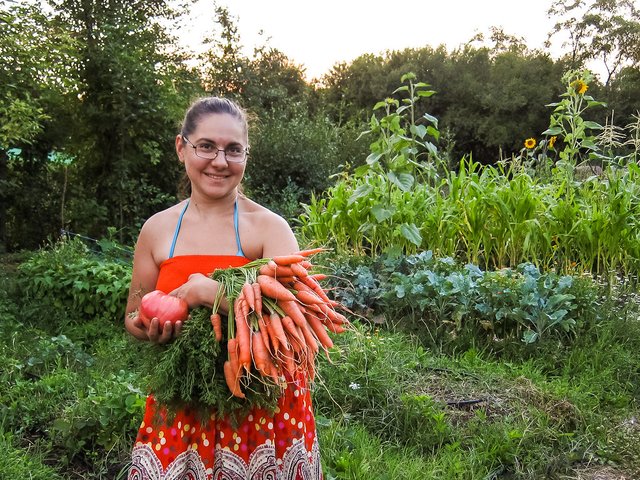
So what we’re doing is trying to lead by example. We grow a part of our food and most of our medicine. We spend as much time outdoors as possible. We eat mainly home cooked food. Of course we compost and drive a small old car, wear second hand, try to buy as few packaged goods as possible, separate trash, we even collect kitchen scraps from friends who live in the city and use those in the compost as well. Sure that won’t make a planetary impact. But it makes us happy, does not inconvenience us in the slightest and kids grow to be healthy in body eating straight from the garden, as well as in spirit, as they learn to marvel at Nature and respect and take care of her.
SC: You've mentioned before that at your day jobs, you end up with lots of paper and that's why the paper you make is 100% recycled. Could you please go into details on how your work may be harmoniously in balance with your environment?
B&G: We got a bit into that in question #1. When working with printed media, off-cuts are a constant waste stream. And while we send the majority of it to a paper recycling plant, we keep the most interesting pieces for our handmade paper work.
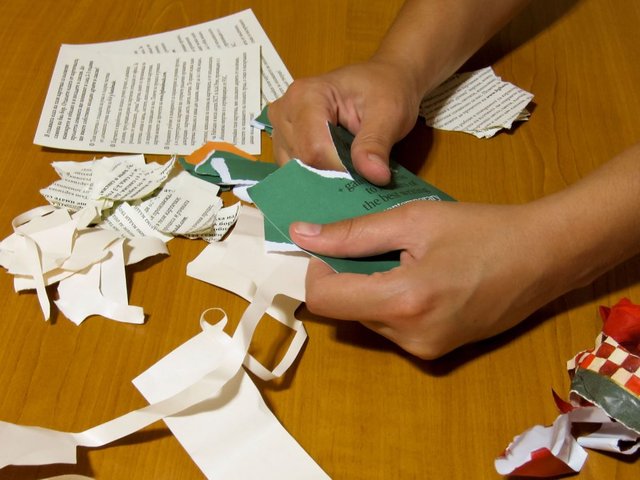
We’re not really sure if there will ever be a way for any modern “job” to be in balance with the environment… We’ll have to go back 10-15000 years back, back to our hunter-gatherer days and “roving horticulturist” ways for that to happen. Still it’s our intention to lower the impact we’re making, even if it’s a minute amount, compared to the whole of humanity.
A small example is convincing a client to choose a factory recycled media for printing this promotional flyer. Or if he insists on specialty paper, propose a FSC certified one. Then use the off-cuts for making handmade paper business cards. This way we not only complete the order in a more environmentally friendly way, but we also use the by-product for additional income.
SC: I am curious to know how Bulgaria generally regards those who chose a more “earth friendly” responsible path like it seems you have chosen. But more importantly, I would like to know what are your feelings on encouraging and influencing neighbors to lead a more environmentally friendly life?
B&G: We’ll have to give some background and context first! In general, the land that Bulgaria as a country sits on was a rural country and most of the population lived in small villages, spread like a large network of communities. That lasted for at least a few thousand years… So the people were in most regards self-sufficient homesteaders, resilient, eco-conscious, organic, call them whatever modern term you’d like :)
That changed in mid-20th century with the coming of the Communist regime after the Second World War. A massive process of urbanisation began. In those 60 years, living in a village became an slight insult, similar to how “redneck” is perceived in the States. People flocked to the towns and cities, to the factories of the regime and the industry.
After the end of the regime in the 90’s, the population’s general attitude was split - some, especially the old timers, born before the regime, bemoaned the destruction of the social fabric of the old time villages and small resilient communities. Others, especially younger people, just fled the country and did not look back. Those that remained were generally sceptical or ignorant about the “earth friendly” ways as you call them, because most struggle with daily life and making ends meet.
However, compared to the western world and especially the States, life here is much less wasteful and much more frugal. A few examples. Eating out here is a privilege for the upper middle class and above. Most of the families cook and eat homemade food with produce from our alternative to a “farmers market”. Canning food is something most families also do, even if they don’t have personal garden - they just buy the produce and can everything, as there’s little trust in the industrial food processes.
Many families have a “village home”, an old house usually inhabited by retired grandparents taking care of a small garden, orchard, a flock of birds, a pig or two, maybe a few goats or sheep, sometimes a cow or a donkey. On weekends and school holidays families gather for communal work in the family “ranch”.
Very few things get thrown away, most stuff gets repurposed or reused. After all those years of YouTube videos we continue to marvel at what things you guys in the States can find in a local dump! Only a very wealthy nation can produce so much high quality “garbage” that it’s not really garbage at all!
So to get back to the question, what we’re trying to do is lead by example. Get in touch with the younger part of our social circle and let them know what we’re doing and the life we’re trying to live. Help them experience Nature more fully by introducing them to different plants, especially medicinal so suddenly a picnic in the forest becomes a field lesson.
We also try to influence middle aged neighbours and friends and relatives, who effectively spent almost their entire life under the regime and have no knowledge or trust in the Old Ways. It’s a bit weird to teach a granny how and more importantly why should she save seeds, but that’s something we do nevertheless :) We help with planning the gardens, making compost, seed saving, we give plants and seeds as gifts, we show how mulching works and we even introduced red wigglers to the manure pile of a sheep farmer!
SC: You guys are just amazing. We are building a sustainability education center (a sort of community based on permaculture, natural building and low cost living), and what you do is truly inspiring to me. There is in deed so much to re-learn from our old ways in terms of waste and re-using... the west sure has become a single-use culture and I think the one and only real way to change that is to lead by example.
I want to express my gratitude to you for having spent a serious amount of thought and time into your answers. I can honestly say that I would like to meet you face to face one day.
Once again, thank you for taking that precious time out of your day to answer my crazy questions 😁!
As a gentle reminder to check them out, here's the link to their shop on HSCO: B & G Handmade!
Thank you so much for reading and stay tuned for next week's featured vendor... Same time, same place!
PS: Special thanks to @Riverflows for the graphics on that first image at the top of the post 💚 and of course @Homesteaderscoop for being an awesome community!!!

Our Free, Community Marketplace
Shop with pride: Our vendors are committed to sustainability for a healthier planet. As a Co-operative we are community run. And unlike other marketplaces our vendors are not charged fees or commissions. Vendors: Learn more
Support Our Alternative Economy
- Purchase handmade products and ethical services at homesteaderscoop.com
- Join the conversation in our Discord chat room
- Donate to our Fundition crowd-funding project; Help us keep our marketplace FREE!
- Delegate Steem Power: 10 | 20 | 50 | 100 | 200 | 500 | 1000
Logo design by FireFly Creations - illustrator & artist available for commission
Great interview and questions @senorcoconut!! This is a really nice way that you are sharing the inside story of @bghandmade - I love how you have taken a waste stream and turned it into a new product line.. and very attractive at that! Thank you for sharing insights into your culture and what has changed, but also what has stayed the same. it is good to learn from each other! Keep up the great work Bobby & Geri - you are great examples of living without compromising your ethics and leaving a better world for your children :)
Thanks @Sagescrub!
It true Bobby amd Geri do a really good job of living without compromising their ethics and leaving a better world for their children.
@bghandmade.... I will have to come visit one day if that's ok by you 😁!
.
I'm really loving the way the hand made paper initiative is an outflow and a way of bringing balance to their print media "day job". Something in me just finds it very REAL to acknowledge the parts of our lives that impact other Earth and others and finds ways to being redress and restoration. Very nice, informative interview!
Leading the curation trail for both @ecotrain & @eco-alex.
Together We’re Making This World A Better Place.
Click Here To Join the manually curated trail "@artemislives" to support quality eco-green content.
@ecoTrain
Yeah, I really like that too! And I thought using the #ecotrain tag was fitting as they are dping quite a lot in the realm of Making This World a Better Place.
Lots of good info.
Using a well thought through & relevant tag is always a winner. 🎉 Pls encourage others to write using the @ecotrain tag... and hoping you can contribute to part 2 of the ecotrain Abundance challenge!! 😊
Posted using Partiko Android
Oh... the Abundance Challenge??? Going over now to take a look. Thanks
The #cryptopeas from @bghandmade are growing. Next update about the conversion of crypto into food will follow soon ;)
Oooh... I like this! I have converted crypto into books and seeds, but never directly into food, not yet at least!